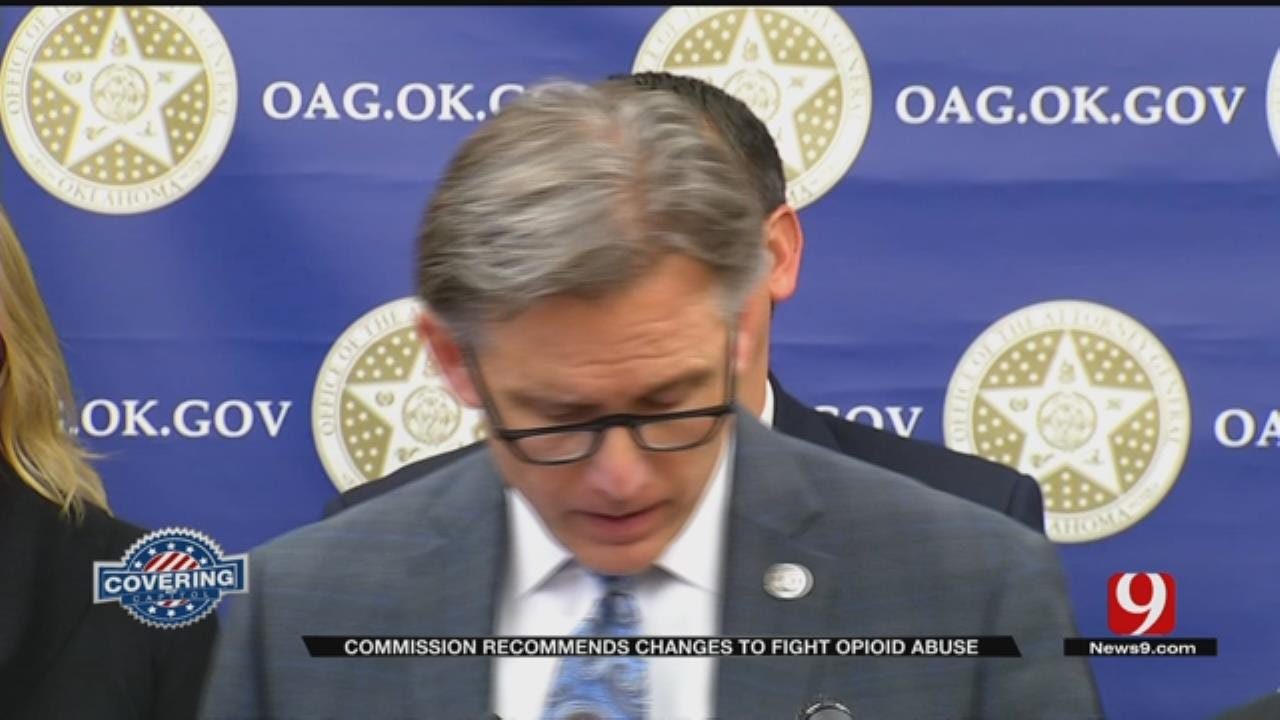Commission Recommends Changes To Fight Opioid Abuse In Oklahoma
<p>The state attorney general and a commission on opioid abuse releases its study into the epidemic in the state of Oklahoma. </p>Tuesday, January 23rd 2018, 7:00 pm
The state attorney general and a commission on opioid abuse releases its study into the epidemic in the state of Oklahoma. And it calls for a lot of changes.
Over the past five months, the commission, made up of law enforcement, doctors, business leaders and lawmakers met with experts on opioid addiction from around the country.
Read Related Story: Plans To Combat State’s Opioid Crisis Unveiled
“In our state over the last 15 years drug overdose deaths have increased by 91-percent and continue to rise,” said State Attorney General Mike Hunter. “Nearly 1,000 Oklahomans die per year to drug overdoses.”
So, the commission released a list of recommendations. They include mandating the use of electronic prescriptions.
“We investigate a lot of forged prescriptions. Pharmacists are handed forged prescriptions and keep prescribing. If that takes place then that should eliminate a lot of forged prescriptions,” said John Scully Director of Bureau of Narcotics.
The committee also recommended passing a good Samaritan law, so people with drugs will not be arrested if they call for help when someone is overdosing.
It also calls for the criminalization of the trafficking of Fentanyl, a synthetic opioid 50-to-100 times stronger than morphine.
“Currently if a drug dealer is pulled over with a pound of Fentanyl there’s nothing a law enforcement official can do,” Hunter said.
The commission also wants a 10-percent tax on makers and sellers of opioids to fund addiction treatment.
“I’ll be stunned, in a word, if there isn’t pushback. This has been a thoughtful decision making process trying to identify a revenue stream,” Hunter said.
That would be a new tax, so that would require a three-fourths majority of lawmakers to back it; something that’s never happened in the state legislature.
“When you have to wait till something reaches a crisis I think even my colleagues across the street can understand that we’ve reached a crisis in our state,” said Senator AJ Griffin (R) Guthrie.
The tax on manufacturers and sellers alone will only raise about $17-million per year, so more funding sources would be needed to treat addiction in the state.
The state attorney general and a commission on opioid abuse releases its study into the epidemic in the state of Oklahoma.
","affiliate":{"_id":"5cc353fe1c9d440000d3b70f","callSign":"kwtv","origin":"https://www.news9.com"},"contentClass":"politics_state","createdAt":"2020-01-31T20:52:34.691Z","updatedAt":"2025-04-02T03:18:32.131Z","__v":15,"breakingNews":[],"entities":[{"_id":"6242201f6880e45323ac6e60","text":"John Scully","type":"PERSON","__v":0},{"_id":"6238f1556880e45323d020b5","text":"Oklahoma","type":"LOCATION","__v":0}],"hasBeenCheckedForEntities":true,"openInNewWindow":false,"rendered":14,"peerReviewer":"5c7850eac1778925af4208da","show":true,"link":"/story/5e349392527dcf49dad7ed5e/commission-recommends-changes-to-fight-opioid-abuse-in-oklahoma","hasSchedule":false,"id":"5e349392527dcf49dad7ed5e"};More Like This
January 23rd, 2018
November 13th, 2024
October 28th, 2024
Top Headlines
April 1st, 2025
April 1st, 2025













